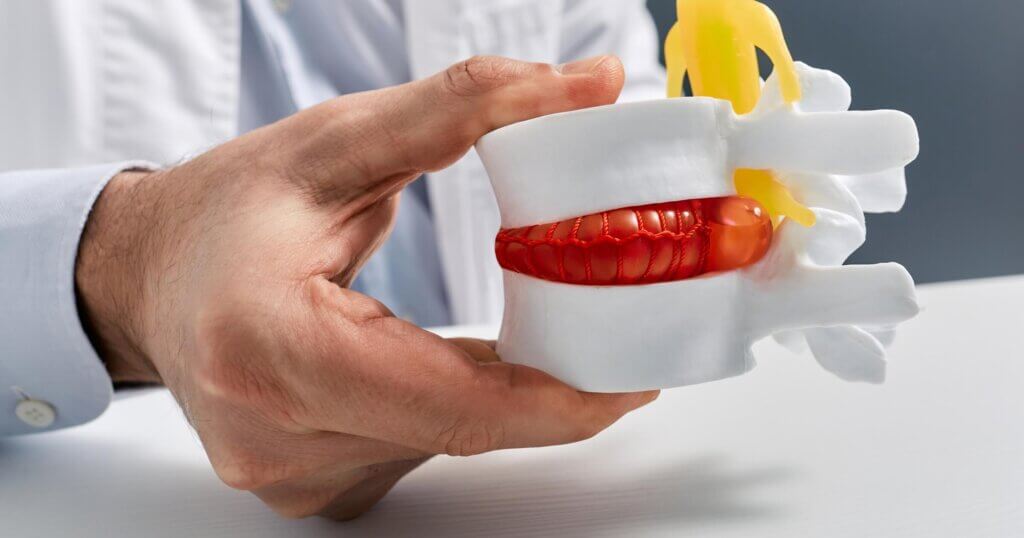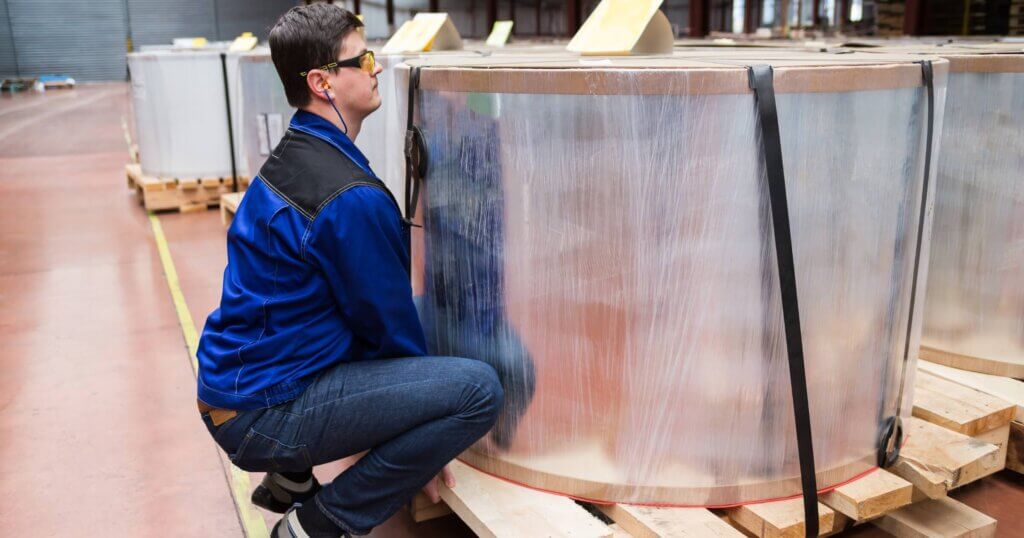Whether you’re hauling materials, crouched in tight spaces, or working overhead for hours, the job puts serious strain on your body, especially your back. For people in the trades, these movements happen every day. Over time, all that physical wear and tear adds up and makes tradespeople more likely to deal with painful injuries like herniated discs. In this guide, we’re going to cover why tradespeople are at higher risk of a herniated disc and what they can do to prevent it.
Quick look:
- Tradespeople face a higher risk of herniated discs due to repetitive strain, poor lifting techniques, awkward positions, and limited recovery time.
- Everyday tasks like overhead work, crouching, and lifting heavy materials gradually wear down spinal discs.
- Preventative habits, like proper lifting, core strengthening, and regular breaks, can significantly reduce injury risk.
- Early signs like numbness, tingling, or muscle weakness should be taken seriously and evaluated by a healthcare professional.
What is a herniated disc?
Your spine is made up of bones called vertebrae, and between each one is a soft, jelly-like cushion known as a disc. A herniated disc happens when the inner part of that cushion pushes out through a tear in the tougher outer layer. This can press on nearby nerves, causing pain or other symptoms.
Herniated discs often happen in the lower back or neck, where movement and strain are constant. Common causes include everyday wear and tear, sudden twisting or lifting, or simply poor posture over time. Many people don’t realize how much posture and tight muscles can affect spinal health until pain sets in.
Symptoms can vary, but some of the most common include pain in one spot, tingling or numbness in the arms or legs, and muscle weakness. These signs usually point to a disc pressing on a nerve, which can make even simple tasks feel challenging.

Photo courtesy of https://www.shutterstock.com/
Why are tradespeople at higher risk of a herniated disc?
Repetitive strain and overuse
Most trades involve doing the same physical tasks day after day. Electricians reach overhead to run wiring. Plumbers crouch in tight spaces. Carpenters swing hammers and lift materials on repeat. These motions may seem small at the time, but over a week, or a career, they can wear down the spine and tighten the supporting muscles.
Repetitive strain is one of the biggest contributors to disc problems. It slowly breaks down the cushioning between your vertebrae, making it easier for a disc to slip out of place or press on a nerve. When the body doesn’t get a break, those little aches and pains can turn into something more serious.
Lifting heavy loads without proper form
Lifting is part of the job in almost every trade, whether you’re carrying lumber, tools, or HVAC equipment. But when it’s done incorrectly, like bending from the waist instead of squatting with your legs, it puts significant pressure on the lower back.
Over time, that kind of strain can damage the discs in your spine and lead to herniation. Jobs like masonry, framing, roofing, or mechanical trades often involve lifting awkward, heavy loads throughout the day. Without proper technique or support, that wear builds up quickly.
Learning to lift with your legs, engage your core, and avoid twisting while carrying weight can make a huge difference.
Awkward or static working positions
Sometimes it’s not the heavy lifting that causes the most damage, but the way your body stays stuck in one position for too long. Whether you’re working overhead, crouched in a crawlspace, or hunched over a surface, these awkward positions put extra stress on your spine.
Holding your body in these positions for hours can wear out the muscles that normally support your back. Once those muscles get tired, your spine takes on the load, and that pressure often lands on the discs. Over time, this can lead to a herniated disc or make an existing issue worse.
Lack of recovery time
In the trades, there’s often little time to rest between physically demanding tasks. Long hours, tight schedules, and the push to finish a job can mean working through pain or fatigue without giving the body a chance to recover.
Even small strains or tweaks, if ignored, can pile up over time. Without proper rest, the body doesn’t get the opportunity to heal, and those minor issues can snowball into something more serious, like a herniated disc. When recovery time is skipped, injuries that could have been prevented become much harder to treat.
To help reduce that risk, make sure you’re listening to your body, switching up tasks when possible, and taking short breaks to stretch or reset. Building those habits into your day can help protect your back over the long haul.
What tradespeople can do to prevent herniated discs
The good news is that herniated discs are often preventable with a few smart habits built into your day. While the work is physically demanding, small changes in how you move, lift, and recover can make a big difference over time. Here are some practical ways to protect your spine on the job:
- Lift with your legs, not your back: Bending at the knees and keeping the load close to your body helps reduce strain on your lower spine.
- Use core engagement during physical tasks: Tightening your abdominal muscles supports your back and helps distribute the load more evenly.
- Take frequent micro-breaks to stretch or change position: Even a quick movement break every hour can help ease pressure on your spine.
- Use knee pads or stools to reduce crouching: Staying low to the ground without support can fatigue your back and hip muscles.
- Wear back braces or ergonomic supports where needed: These can add extra stability, especially during repetitive lifting or long shifts.
- Strengthen core and mobility through exercise: A strong, flexible body can better handle the physical demands of trade work.
- Rotate tasks when possible to avoid overuse: Switching it up can give certain muscle groups a break and reduce the chance of repetitive strain.

Proper lifting technique being shown by worker. Photo courtesy of https://www.shutterstock.com/
When to seek help
Back pain is common in the trades, but some symptoms are a sign that it’s time to get checked out. If you notice numbness, tingling, or shooting pain that travels down your arms or legs, don’t ignore it. These can be signs that a disc is pressing on a nerve.
Muscle weakness, especially if you’re having trouble gripping tools or lifting objects, is another red flag. These symptoms may mean that the injury is affecting your nerves, not just your muscles.
Catching it early can make a big difference. Seeing a doctor, physiotherapist, or chiropractor at the first sign of trouble can help you avoid long-term damage and get back to work faster.
FAQ
What jobs should I avoid with degenerative disc disease?
If you’ve been diagnosed with degenerative disc disease it’s best to avoid jobs that require repetitive heavy lifting, constant vibration from tools like jackhammers, or long periods of bending, twisting, or standing in one position. These types of tasks speed up disc wear and increase your risk of further injury.
Can a chiropractor fix a herniated disc?
A chiropractor can’t technically “fix” a herniated disc, but they may be able to help manage the symptoms. Spinal adjustments, decompression therapy, and targeted exercises can sometimes relieve pressure on the nerves and reduce pain.
Can you permanently fix a herniated disc?
Many herniated discs heal with a mix of rest, physical therapy, and lifestyle changes that reduce stress on the spine. In more serious cases, surgery might be needed. Whether or not a herniated disc can be permanently fixed depends on the severity of the injury and how well your body responds to treatment.
Bottom line
Tradespeople are the backbone of the built world, and that kind of work demands a lot from the body. From long hours on your feet to heavy lifting and awkward positions, it’s no surprise the spine often takes the hit. But the more you understand the risks, the better you can protect yourself.
Small daily habits like lifting properly, taking stretch breaks, and strengthening your core can go a long way toward preventing a herniated disc.
Want more practical tips like this delivered straight to your inbox? Subscribe to our newsletter for updates, safety advice, and wellness strategies built for people in the trades.



1 comment